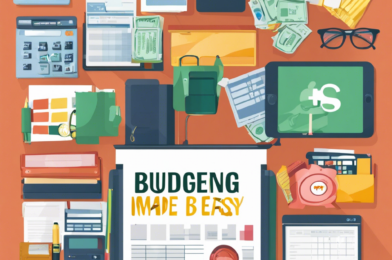Creating a budget might seem like a daunting task, especially if you’ve never done it before or believe that your income is too low to start saving. But the truth is, budgeting is an essential skill that empowers you to take control of your finances, no matter your income level. It’s the cornerstone of financial literacy, enabling you to manage your money effectively and work towards your financial goals. In this guide, we’ll explore practical strategies to make budgeting accessible and manageable for everyone.
**Understand Your Current Financial Situation:** The first step towards effective budgeting is understanding your current financial reality. Gather your recent pay stubs, bills, bank statements, and any other financial documents. Calculate your monthly income, including salary, investments, and any other sources of income. Then, list all your monthly expenses, such as rent, utilities, groceries, transportation, subscriptions, and entertainment. This comprehensive overview will help you identify areas where you can trim unnecessary expenses and allocate money to savings or investments.
**Distinguish Needs from Wants:** One of the most challenging aspects of budgeting is learning to distinguish between needs and wants. Needs are essential expenses that ensure your basic survival and well-being, such as food, shelter, healthcare, and transportation. Wants, on the other hand, are discretionary expenses that provide enjoyment or convenience but are not necessary for survival. Budgeting involves prioritizing needs over wants and making conscious choices about where to allocate your money.
**Create a Realistic Budget:** Develop a monthly budget by subtracting your total expenses from your total income. Ensure your budget is realistic and adaptable, allowing for some flexibility. Start by allocating money to fixed expenses like rent or mortgage payments, insurance premiums, and subscriptions. Then, factor in variable costs like groceries, transportation, and entertainment, which can be adjusted as needed.
**Embrace Budgeting Tools:** Numerous budgeting apps and software are available to simplify the process. These tools can help you track expenses, create visual representations of your budget, and provide insights into your spending habits. Many are free and user-friendly, catering to both novice and experienced budgeters.
**Automate Your Savings:** Set up automatic transfers from your checking account to your savings account to make saving effortless. Automating your savings ensures that a portion of your income is consistently put aside for future goals, emergencies, or investments.
**Review and Adjust:** Regularly review your budget and actual spending to ensure they align. This can be done weekly or monthly, depending on your preference. Adjust your budget as necessary to accommodate unexpected expenses or changes in income.
**Save on Essentials:** Find ways to save on essential expenses without compromising your quality of life. Shop around for the best deals on groceries, use coupons, or consider buying in bulk for non-perishable items. Review your insurance policies to ensure you’re getting the best rates and coverage.
**Budgeting for Different Income Levels:** The budgeting strategies you employ may vary depending on your income level. High-income earners may focus on maximizing investments and minimizing taxes, while those with lower incomes may prioritize debt repayment and building an emergency fund.





